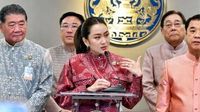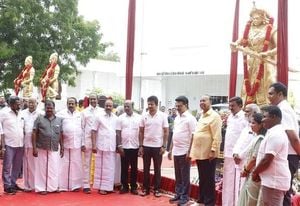Bangkok’s political stage is set for a high-stakes showdown as suspended Prime Minister Paetongtarn Shinawatra faces mounting scrutiny over a leaked phone conversation with former Cambodian Prime Minister Hun Sen. The controversy—now dubbed the “audio clip case”—has rapidly evolved into a defining moment for Thailand’s government, testing the boundaries of executive discretion, diplomatic engagement, and ethical conduct in the country’s turbulent political landscape.
On August 19, 2025, cybercrime police and public prosecutors questioned Paetongtarn as a witness in an ongoing investigation targeting Hun Sen. According to The Nation, Hun Sen stands accused of deliberately recording and leaking a private call with Paetongtarn, allegedly to spark political turmoil in Thailand. The case, filed under Article 116 of the Criminal Code, centers on charges that the leak was intended to incite protests against the Thai government. Several individuals have filed complaints with the Cyber Crime Investigation Bureau (CCIB), and authorities plan to complete further interrogations by the end of August. Deputy Attorney-General Watcharin Phanurat told reporters that, if charges proceed, the Criminal Court could issue an arrest warrant for Hun Sen—potentially leading to an Interpol red notice that would sharply restrict his international travel.
But the legal drama doesn’t end with Hun Sen. Paetongtarn herself faces a barrage of separate complaints lodged with the Central Investigation Bureau (CIB), accusing her of sedition, specifically for allegedly yielding to Hun Sen’s demands and criticizing the Second Army Area commander during their conversation. These complaints have been forwarded to the National Anti-Corruption Commission (NACC) for further investigation, adding yet another layer of complexity to the saga.
All eyes are now on the Constitutional Court, which is scheduled to deliver its verdict on August 29, 2025. The petition, filed by 36 senators, alleges that Paetongtarn breached the prime minister’s ethical standards during her call with Hun Sen. The outcome could reshape not only her political fate but also the future of Thailand’s executive diplomacy. As The Thaiger reports, the Pheu Thai Party—Paetongtarn’s political base—has rallied behind her, expressing “unwavering support” and dismissing the possibility of coalition realignment even if leadership changes occur.
Visuth Chainaroon, a Pheu Thai list-MP and chief government whip, was emphatic about the party’s confidence. “Her comments during a private call with Cambodian Senate President Hun Sen were meant to safeguard national interests and maintain peace amidst rising tensions,” he told Parliament. Visuth also downplayed legal concerns, noting that the conversation fell outside formal negotiations and that the Thai-Cambodian border situation remains under military supervision. The party, he said, is not preparing contingency plans—Paetongtarn acted in good faith and is expected to receive justice.
Should the court rule against her, Pheu Thai has contingency measures in place. Chaikasem Nitisiri, another party stalwart, is ready for nomination in a House vote if a new prime minister must be selected. Meanwhile, Digital Economy and Society Minister Prasert Jantararuangtong refuted rumors of Paetongtarn’s potential resignation, underscoring her resolve to see the process through. Paetongtarn herself has submitted a defense to the Constitutional Court, arguing that her remarks were merely negotiation tactics, not illicit offers or ethical breaches.
Yet, the political climate remains heavy with uncertainty. Paetongtarn has skipped two consecutive cabinet meetings, as reported by Bangkok Post, fueling speculation about her next moves. Tourism and Sports Minister Sorawong, responding to rumors that Pheu Thai might support a return to power for Prayut Chan-o-cha in alliance with the Bhumjaithai Party, firmly dismissed such claims as “entirely false.” Sorawong expressed confidence in Paetongtarn’s ability to weather the storm, asserting, “We are very confident. That is why I have said these rumours should not shake confidence in our work. It is already difficult enough for us to function. Everyone is waiting for August 29 to see what happens.”
Paetongtarn is expected to attend the Constitutional Court hearing on August 21—her birthday and the day of a House session—where she may take the stand alongside Chatchai Bangchuad, Secretary-General of the National Security Council. She has also requested four additional witnesses to testify about her diplomatic intentions, hoping to clarify her rationale and reduce political tension.
The stakes are high. Observers warn that a ruling against Paetongtarn could have far-reaching implications, potentially restricting how ministers communicate with foreign leaders and fundamentally changing Thailand’s diplomatic playbook. Conservative activists, such as the Ruam Palang Phaendin group, have seized on the controversy, planning to hold a press conference outside Parliament on August 21 to highlight concerns over border disputes and past MOUs with Cambodia—some signed during the tenure of Paetongtarn’s father, Thaksin Shinawatra.
The Pheu Thai Party, for its part, insists that Paetongtarn’s actions were motivated by a desire to protect Thai citizens and avoid border conflict. On August 18, Wisut Chainarun, chairman of the coalition coordination committee, addressed Parliament: “The Prime Minister acted to protect tens of thousands of Thais. Her intentions should be seen as protective rather than controversial.” He added that delaying action during the call may have prevented immediate conflict and that the government’s focus remains on economic recovery and public welfare, including agricultural support for dry-season rice crops.
Wisut was adamant that the coalition majority remains stable, with no need for a government reshuffle. “Discussions about replacing the Prime Minister should wait until after the next election,” he said, emphasizing that public trust and military confidence remain strong. Dr. Prommin Lertsuridej, the Prime Minister’s Secretary-General, acknowledged a slight possibility of voluntary resignation but said no official decision had been made.
Opposition voices, however, continue to press for Paetongtarn’s resignation, arguing that ethical standards demand accountability. Jatuporn Prompan, leader of the People’s Alliance for Democracy, commented that resignation could prevent further political damage. Meanwhile, the Supreme Court has scheduled a hearing for September 9 to address legal matters involving Thaksin Shinawatra, further raising the political stakes.
The “audio clip case” has become a lightning rod for broader debates over executive discretion, national sovereignty, and the legitimacy of political power in Thailand. As the country awaits the August 21 hearing and the August 29 verdict, the outcome will not only determine Paetongtarn’s future but also set a precedent for how Thailand balances diplomacy, ethics, and political survival.
Whatever the verdict, these coming weeks will shape Thailand’s political trajectory for years to come.





